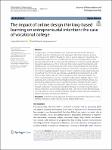Item Infomation
Full metadata record
| DC Field | Value | Language |
|---|---|---|
| dc.contributor.author | Issariya, Woraphiphat | - |
| dc.contributor.author | Pattama, Roopsuwankun | - |
| dc.date.accessioned | 2023-05-17T01:47:43Z | - |
| dc.date.available | 2023-05-17T01:47:43Z | - |
| dc.date.issued | 2023 | - |
| dc.identifier.uri | https://link.springer.com/article/10.1186/s13731-023-00278-z | - |
| dc.identifier.uri | https://dlib.phenikaa-uni.edu.vn/handle/PNK/8466 | - |
| dc.description | CC By | vi |
| dc.description.abstract | Entrepreneurial intention is fundamental to decision-making and the behaviors needed to become entrepreneurs, with subsequent effects on economic development. However, the COVID-19 pandemic calls for a novel approach to teaching entrepreneurship owing to the shift to online learning. The current study explores entrepreneurial intention and the satisfaction derived from the entrepreneurship education program. In particular, we offer a framework that explains students’ satisfaction and entrepreneurial intention by integrating the theory of planned behavior with design thinking-based entrepreneurship courses, peer interactions, and speaker interactions. The entrepreneurship education program was for vocational college students located in Southeast Asia. | vi |
| dc.language.iso | en | vi |
| dc.publisher | Springer | vi |
| dc.subject | Entrepreneurial intention | vi |
| dc.subject | decision-making | vi |
| dc.title | The impact of online design thinking-based learning on entrepreneurial intention the case of vocational college | vi |
| dc.type | Book | vi |
| Appears in Collections | ||
| OER - Kinh tế và Quản lý | ||
Files in This Item:

